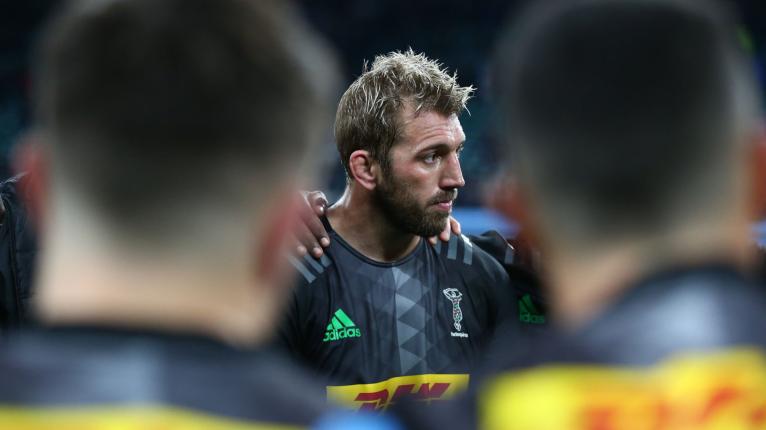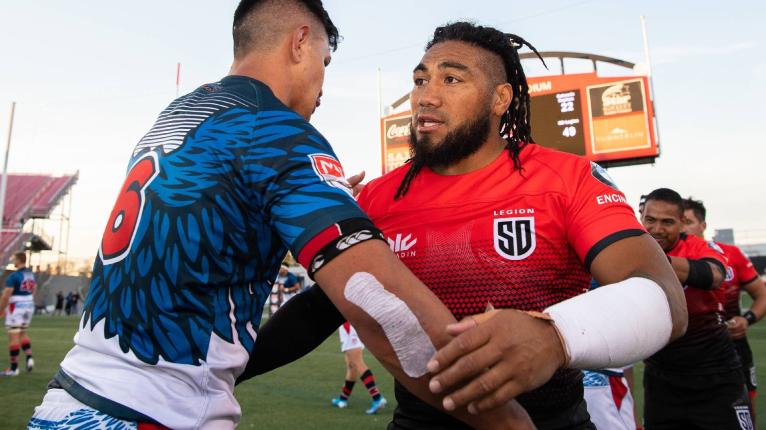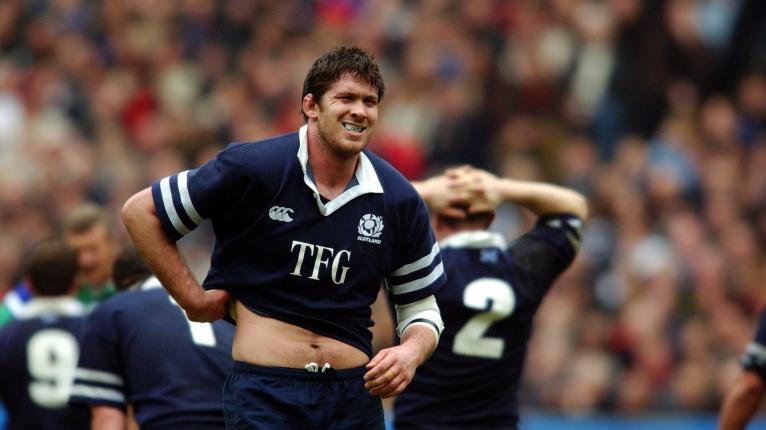'The first couple of weeks, he didn't really say much. Until he'd played a game'

Scott Murray’s carefully planned coaching voyage was bowling along nicely in the south of France, the former lock gaining his qualifications, cultivating contacts and looking after the forwards at Mont-de-Marsan where he finished his playing days, when wife Lisa delivered a stark message that brought the enterprise to an abrupt halt.
Murray, for a time, was Scotland’s record caps holder and a 2001 Lion, a tremendous second-row whose international career spanned three World Cups and the Five Nations triumph of 1999.
But after nearly ten years in France, where he had played for Montauban, Castres and Mont-de-Marsan, California-born Lisa was yearning for home.
“In France, they put me through all my coaching courses, they sent me to the National Centre of Rugby at Marcoussis, so I was lucky – and then I wasn’t lucky,” Murray tells RugbyPass.
“My wife said, ‘I’ve had enough of France, I want to leave’. I’m like, what? You’re drinking rose on a Tuesday afternoon and you want to leave?
“So yeah, I spent all this time learning French and making contacts to move to America where everyone speaks Spanish and I don’t know anyone. It was a tough transition.”
From working in the ProD2, Murray took a job in construction, coaching amateur and college teams in Santa Monica before finding a route into the inaugural Major League Rugby as forwards coach of San Diego Legion two years ago.
The 2020 season, running from February to June, was abandoned as coronavirus spread across the States, but for next term, the Scot has been promoted to the top job, which he will share with former American international Zack Test.
The competition is beginning to blossom, with crowds growing, new teams arriving in Los Angeles and Dallas taking the league’s cohort to 13, and serious veteran talent lured across the Atlantic by the unique lifestyle and the smell of fresh opportunity.
Chris Robshaw, the former England captain, has signed for San Diego next season and represents a monumental capture. Murray hopes to bring back the colossal All Blacks centre Ma’a Nonu for a second spell in 2021 after the two-time World Cup winner made a profound impact in this year’s truncated campaign, while Australian international Paddy Ryan and Italy lock Josh Furno have also played influential roles.
“Ma’a Nonu could make what he makes here in a month in France easily. The money isn’t brilliant; we understand they are coming here under their market value,” Murray says.
“For Chris, it’s the lifestyle thing, and also he doesn’t want to be playing 40 games a year. That’s a huge pull here – we’ve got a 16-game season, plus he gets to experience something else.

“San Diego is awesome, the weather is brilliant, the beach is brilliant, and the club culture and atmosphere is very good. It has to be for someone like Ma’a Nonu to want to come back.
“We try and make it attractive to come and play here, but we want all of our players to grow as people as well. California is quite out-there, they’re big into meditation and yoga and health drinks and breathing techniques underwater, recovery days and barbecues on the beach, a lot of things you wouldn’t find back home that we can actually go and do.
“We’ve got the big Marine base here, Miramar [the site of the real Top Gun], and we’re trying to form relationships with these places. If you’re talking about stress, I don’t think there’s a more stressful job than a jet fighter, so we try to get these guys in to do talks and get the guys out to the base to see what the Marines go through on Hell Week.”
Naturally, signing one of the game’s true greats had a transformative effect on the young Americans in San Diego’s squad. They feasted on the wisdom of Nonu, an All Blacks centurion whose CV is festooned with silverware.

“Some American guys don’t know how to be a professional rugby player – they never have been,” Murray says. “When I first arrived in America, the whole ethos was whenever, however, whatever. You could be changing at the side of a field, or taking your own car to get to games.
“Analysis-wise, all that stuff he’s been doing for years as second nature, he’s now showing those guys how to do it, how do you see what your opposition is doing, how do you know what type of player he is, whether he steps off his left or right foot, how do you look after your body, how do you switch off and on. A lot of these American kids are constantly on and get burned out.
“The first couple of weeks, he didn’t really say much. He worked his ass off to get his bronco, worked his ass off to hit his test results. Until he’d played a game, he didn’t really say much to the team.

“Once he’d played that first game and played well, he came out of his shell. For a man of his calibre to come in and make sure he was where he needed to be before he told other people what to do was outstanding. Then he started to open up, he took some meetings, played some really good rugby and was very, very good for our team.”
For an age now, rugby has grappled with how best to crack America, and unlock even a modicum of its vast sporting riches. An engaged and hungry American rugby scene could yield critical revenue and a massive new market. It might also deliver bright thinking on how to run a game often accused of crusty reticence to change with greater vibrancy.
Nobody has quite managed to make it all happen yet, but the MLR clearly has legs, and the hope is that its steady growth represents the first tangible footsteps on the journey.
“Get the kids involved and get it on TV – those are your two keys for America,” Murray says. “If you get young kids in now, further down the line there will be more interest, more players, more spectators. We’re in the process, I’ve heard, of signing a TV deal which would be huge.
Happy Father’s Day to all the rugby dad and coaches! ?
An extra special day to our very own co-Head Coaches, Scott Murray and Zack Test, who recently welcomed new babies to their families. pic.twitter.com/BehfvwfICD
— San Diego Legion (@SDLegion) June 21, 2020
“When I first arrived here, we were getting 2,000 people a game. Last season, for the last few games, we were getting 6-7,000. It’s already started. But we’ve got to concentrate on getting the young ones in.
“With the concussion stigma around American football, a lot of people are going towards rugby as a contact sport. The high school and kids rugby here in San Diego is very good, there are a lot of kids playing.
“We send a couple of players to each high school as coaches, just to get the Legion name out there, but also to get these kids excited about rugby. Zack does seminars with coaches, we’re trying to help as much as we can, and it’s all gratis, trying to grow the game and get people involved as much as we can.”
The MLR has drawn significant intrigue from afar, with Murray finding established coaches in Europe are just as eager to hear about his experiences as he is to lap up their insights. He has used the enforced suspension of rugby as an opportunity to learn from as many people as he can. There have been Zoom calls with Stuart Lancaster in Ireland and Mick Byrne, the kicking specialist, as well as old pals from Scotland in Nathan Hines and Roddy Grant.
He knows that one day, years down the track, he may have to leave America to realise his coaching ambitions, but he cherishes his life in San Diego. Earlier this month, Lisa gave birth to their second child, and there is a precious opportunity for him to flourish with the competition.
“If there’s a better job in America, I couldn’t tell you what it is,” he says. “If there’s a better place to live and play rugby, I couldn’t tell you where it is.
“I just thank my lucky stars I got in here and I’m doing what I’m doing. I will stay here as long as I can, but I want to grow as a coach, and maybe there are opportunities to go somewhere for a week, or get involved with some USA Eagles stuff. But this is just getting started over here and it’s going to grow very, very quickly.”


























































